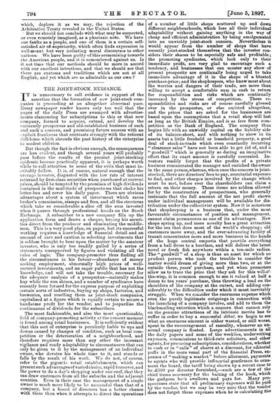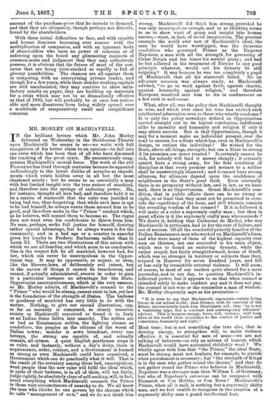THE JOINT-STOCK NUISANCE.
TT is unnecessary to call evidence in support of the assertion that the formation of new joint-stock com- lanies is proceeding at an altogether abnormal pace. Every newspaper reader knows only too well that the pages of the daily Press are swamped with advertise- ments clamouring for subscriptions to this or that new company, formed to acquire, extend, and develop the eminently prosperous and old-established business of such and such a concern, and promising future success with an _explicit frankness ;hat contrasts strongly with the reticent diffidence which shrouds the past history of the enterprise iu modest oblivion.
But though the fact is obvious enough, the consequences are less evident, and though several years will probably pass before the results of the present joint-stocking • epidemic become practically apparent, it is perhaps worth while to call attention to some of the evils that must in- evitably follow. It is, of course, natural enough that the average investor, disgusted with the low rate of interest returned by first-class securities when purchased at current prices, should be tempted by the promises of high dividends 'contained in the multitude of prospectuses that choke his letter-box and cover his daily paper. There are obvious advantages about a system of investment which saves broker's commission, stamps and fees, and all the etccateras which take so considerable a slice off the sum invested when it passes through professional hands on the Stock Exchange. A subscriber to a new company fills up the Application form and draws a cheque, buying his securi- ties direct from the producer and eliminating the middle- men. This is a very good plan, on paper, but its successful working requires a knowledge of financial detail and an amount of care and caution in selecting investments that is seldom brought to bear upon the matter by the amateur investor, who is only too readily gulled by a series of statements unsupported by figures and violating all the rules of logic. The company-promoter thus finding all the circumstances in his favour—abundance of money seeking employment, abnormally high prices of well- secured investments, and an eager public that has not the knowledge, and will not take the trouble, necessary for the adequate analysis of a prospectus—naturally makes hay while the sun shines, and a number of syndicates have recently been formed for the express purpose of exploiting .certain sorts of industries, buying up shops, factories, and breweries, and reselling them as joint-stock companies, capitalised at a figure which is equally certain to secure a handsome profit for the vendor, and to jeopardise the continuance of dividends for the subscribers.
The most fashionable, and also the most questionable, field of company-promoting activity at the present moment is found among retail businesses. It is sufficiently evident that this sort of enterprise is peculiarly liable to ups and downs caused by changes of condition, such as local com- petition or the deterioration of a neighbourhood, and therefore 'requires more than any other the incessant vigilance and ready adaptability to circumstances that can only be given to it by the management of an individual owner, who devotes his whole time to it, and stands or falls by the result of his work. We do not, of course. refer to the gigantic retail establishments, which can present such advantages of varied choice, rapid turnover, and the, power to do a day's shopping under one roof, that they can draw customers from all the suburbs and the adjacent counties. Even in their case the management of a single owner is much more likely to be successful than that of a company, but a board of directors has a better chance with them than when it attempts to direct the operations of a number of little shops scattered up and' down different neighbourhoods, which lose all their individual adaptability without gaining anything in the way of cheap and efficient administration by being amalgamated into an unwieldy joint-stock concern. Nevertheless it would , appear from the • number of shops that have recently joint-stocked themselves that the investor con- siders their shares to be especially safe and profitable ; the promoting syndicates, which look only to their immediate profit, are very glad to encourage such a tendency, and businesses that can - muster any show of present prosperity are continually being urged to take immediate advantage of it in the shape of a bloated. purchase-price; and the shopkeepers, who know'most about the worries and dangers of their trade, are more than willing to accept a comfortable sum in cash in return for responsibilities and risks which are continually increased by the stress of competition.. These re- sponsibilities and risks are of course carefully glossed over in the prospectus, or else omitted altogether, and the prices that are asked for the businesses are based upon the assumptions that a retail shop will last as long as the British Empire, and is as free from com- petition as the Bank of England. The company thus begins life with an unwieldy capital on the liability side of its balance-sheet, and with nothing to show in its assets but a little freehold or leasehold property, a good deal of stock-in-trade which even constantly recurring " clearance sales " have not been able to get rid of, and a " goodwill " which is generally so daring an imaginative effort that its exact amount is carefully concealed. In- vestors readily forget that the profits of a private business remunerated the manager and enriched the owner in the same person,whereas, when once the concern is joint- stocked, there are directors' fees to pay, secretarial expenses to find, and other charges involved by the change which must be met, before ever the shareholders can claim a return on their money. These items are seldom allowed for by the constructors of prospectuses, who generally insinuate that the full amount of the net profit shown under individual management will be available for dis- tribution under the collectivist system. Now it is notorious that shopkeeping is a business that, under the most favourable circumstances of position and management, cannot claim permanence as one of its advantages. New shops spring up, and mere novelty has a great attraction for the sex that does most of the world's shopping ; old customers move away, and the ever-advancing facility of transit concentrates more and more business in the hands of the huge central emporia that provide everything from a ball dress to a bootlace, and will deliver the latest novel or fresh fish anywhere within a ten-mile radius. The " goodwill" of a shop is thus an asset for which no prudent person who took the trouble to consider the matter would dream of giving more than two, or at the outside three, years' purchase, and yet when promoters allow us to trace the price that they ask for this will-o'- the-wisp, it is common enough to see it valued at half a dozen to ten years' purchase, thus throwing a load on the shoulders of the company at the outset, and adding con- siderably to the difficulties under which it must inevitably struggle. When we col:alder the enormous expense which even the purely legitimate outgoings in connection with the launching of a company involve, and add. to them the blackmailing extortion which a concern, that cannot , rely on the genuine attractions of its intrinsic merits has to suffer in order to buy a successful debut, we begin to see what an enormous amount is either wasted, or still worse, spent in the encouragement of rascality, whenever an un- sound company is floated. Large advertisements in all the daily papers and some of the weeklies, underwriting expenses, commissions to third-rate solicitors, and other agents, for.procuring subscriptions, considerations, whether in cash or in " calls " of shares at a discount, foreditorial puffs in the more venal part of the financial Press, eif, penes of "making a market" before allotment, payments to agents who will provide influential gentlemen to orna- ment the board, the tariff being shown by a recent case to be .2500 per director furnished,—such are a few of the chief items necessary for the baiting of the hook, which the gudgeon both swallows and pays for. Many pros spectuses state that all preliminary expenses will be pall by the vendor, but we may be very sure that the vendor does not forget these expenses when he is calculating the amount of the purchase-price that he intends to demand, and that they are ultimately, though perhaps not directly, found by the shareholders.
With these initial difficulties to face, and with capable and honest directors becoming ever scarcer with the multiplication of companies, and with an ignorant body of shareholders who have no power of cohesion or of enforcing upon the board any glimmering instincts of common-sense and judgment that they may collectively possess, it is obvious that the future of most of the con- cerns that are being joint-stocked so rapidly is full of gloomy possibilities. The chances are all against them in competing with an enterprising private trader, and though for a few years, while their slender working capitals are still unexhausted, they may contrive to show satis- factory results on paper, they are building up materials for a crisis which may not be so dramatically effective as that of 1890, but will probably be at once less notice- able and more disastrous from being widely spread over a multitude of comparatively small and insignificant concerns.







































 Previous page
Previous page